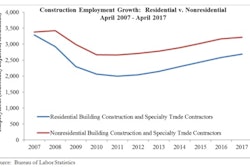By Mark Niquette
President Donald Trump’s plan to invest $1 trillion in U.S. infrastructure with the help of public-private partnerships has hit a speed bump in Texas.
Wary of public opposition to new highway tolls, the Texas House voted on May 5 to reject a bill that would have allowed the partnerships, known as P3s, to participate in 18 highway projects costing as much as $30 billion. The defeat leaves the second most-populous U.S. state unable to tap into the partnerships to finance the infrastructure improvements, even as Trump is proposing to expand their use.
“Clearly, we’ve kind of hampered our ability to take advantage of that in a significant way,’’ said C. Brian Cassidy, an Austin attorney who represents seven regional public authorities that Texas counties have created to do transportation projects.
The bill’s failure underscores the difficulty Trump faces in his bid to use private investment to reach $1 trillion in funding to rebuild roads, bridges, airports, veterans’ hospitals and other facilities. While P3 deals take different forms, they generally involve private investors accepting risk and responsibility for design, construction and operation of a project in return for a revenue stream made up of tolls, user fees or regular tax outlays known as “availability payments.” The White House press office declined to comment on the vote.
Nationwide, 13 states have yet to adopt legislation authorizing some form of public-private partnership deals, according to Moody’s Investors Service, and states including Texas, New Mexico and Mississippi tried unsuccessfully to pass P3 measures this year. Now, some advocates say there aren’t enough willing public partners, and there’s too little predictability for investors.
“The president can put this out there, and I applaud him for him for doing that,’’ said Mary Peters, a consultant and former U.S. transportation secretary. “But at the end of the day, local government officials, mayors, governors, others, are going to have to step up."

















![Fcp Racatac Chair 10893876[1]](https://img.forconstructionpros.com/mindful/acbm/workspaces/default/uploads/2025/10/fcp-racatac-chair-108938761.10l0At5WXv.png?ar=16%3A9&auto=format%2Ccompress&bg=fff&fill-color=fff&fit=fill&h=135&q=70&w=240)
